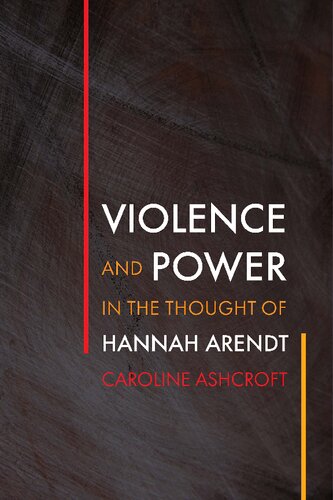

Most ebook files are in PDF format, so you can easily read them using various software such as Foxit Reader or directly on the Google Chrome browser.
Some ebook files are released by publishers in other formats such as .awz, .mobi, .epub, .fb2, etc. You may need to install specific software to read these formats on mobile/PC, such as Calibre.
Please read the tutorial at this link: https://ebookbell.com/faq
We offer FREE conversion to the popular formats you request; however, this may take some time. Therefore, right after payment, please email us, and we will try to provide the service as quickly as possible.
For some exceptional file formats or broken links (if any), please refrain from opening any disputes. Instead, email us first, and we will try to assist within a maximum of 6 hours.
EbookBell Team

5.0
20 reviewsHannah Arendt was one of the foremost political theorists of the twentieth century to wrestle with the role of violence in public life. Yet remarkably, despite the fact that it was perhaps the most pressing issue of her era, this theme in her work has rarely been explored. In Violence and Power in the Thought of Hannah Arendt, Caroline Ashcroft deepens our understanding of Arendt's conception of the role of violence, offering a critical reading of her work and using it as a provocation to think about how we might engage with contemporary ideas.
Arendt has generally been thought to exclude acts of violence from "the political," based on her supposed idealization of ancient democratic politics. Ashcroft argues that Arendt has been widely misunderstood by both critics and advocates on this. By examining Arendt's thought on violence in key examples of political practice such as modern Jewish politics, the politics of Greece and Rome, and the French and American revolutions, Ashcroft reveals a more pragmatic notion of the place of violence in the political. She argues that what Arendt opposes in political violence is the use of force to determine politics, an idea central to modern sovereignty. What Arendt criticizes is not violence as such, but the misuse of violence and misunderstandings of politics which exclude participatory power altogether.
This work also engages with a wider set of concerns in political theory by obliging us to rethink the relations between violence and politics. Arendt's work offers a way to bridge the gulf between sovereign or realist politics and nonhierarchical, nonviolent participatory politics, and thus offers valuable resources for contemporary political theory.